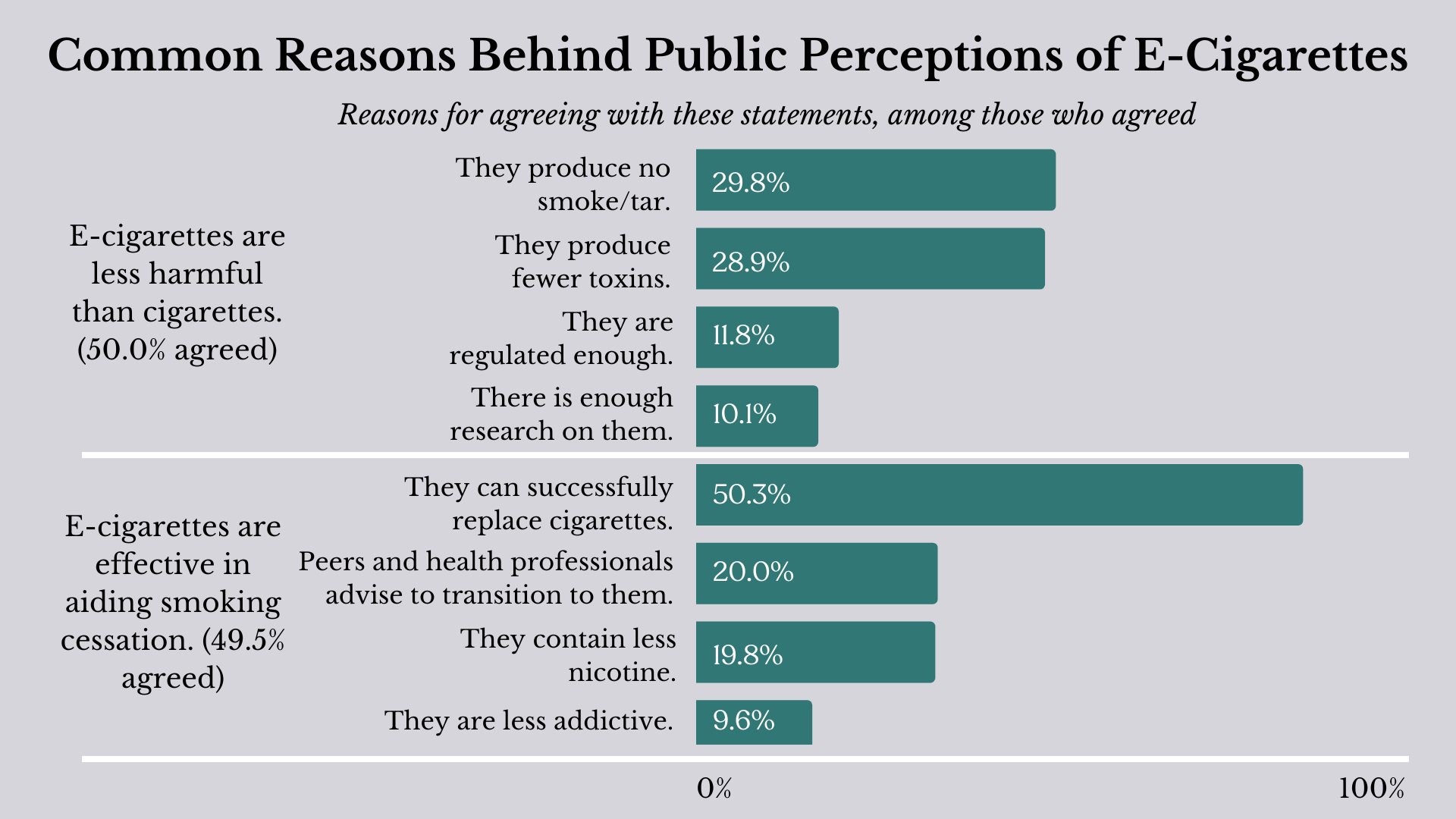ASHES, Vol. 19(9) – Common reasons behind public perceptions of e-cigarettes in Northern England
Although adolescent e-cigarette use is a public health concern, e-cigarettes do produce fewer toxic chemicals than conventional cigarettes and are effective in aiding smoking cessation. Despite these benefits for people trying to stop smoking, many people perceive e-cigarettes as equally or more harmful than cigarettes. Misinformed public perceptions of e-cigarettes might lead smokers to continue smoking conventional cigarettes rather than e-cigarettes, which could negatively impact public health. This week, ASHES reviews a mixed methods study by Humairah Arshad and colleagues that examined the common reasons behind public perceptions of e-cigarettes and its role in smoking cessation in Northern England.
What was the research question?
What are the common reasons behind public perceptions of e-cigarettes compared to conventional cigarettes and the effectiveness of e-cigarettes in aiding smoking cessation?
What did the researchers do?
The researchers recruited 1,646 participants aged 16+ from Northern England, which is an area with a relatively high smoking prevalence. Participants completed a series of questionnaires that measured their perceptions on e-cigarette harm, the effectiveness of e-cigarettes in aiding smoking cessation, their e-cigarette use, and smoking status. Participants also completed open-ended responses to explain the reasons for their perceptions, which the researchers then coded into different categories (see Figure).
What did they find?
Half of participants agreed with the idea that e-cigarettes are less harmful than cigarettes. The most common reasons for agreeing were related to e-cigarettes producing no smoke/tar (29.8%) and containing lower levels of toxins than cigarettes (28.9%; see Figure). Among those who disagreed, 17.2% did so because of a perceived lack of trustworthy research on e-cigarettes (23.7%) and concerns about their safety regulations (20.8%). Additionally, half agreed with the idea that e-cigarettes are effective in aiding smoking cessation. The most common reasons for agreeing were related to e-cigarettes being able to successfully replace smoking (50.3%) and advice from health professionals and peers (20%; see Figure). Among those who disagreed, 13.1% did so because of perceptions of e-cigarettes still being addictive (34.3%) and containing nicotine (15.3%).

Figure: This figure displays the common reasons why participants (n = 1,646) agreed with the statements “e-cigarettes are less harmful than tobacco cigarettes” and “e-cigarettes are an effective cessation aid to stop smoking regular cigarettes.” Click image to enlarge.
Why do these findings matter?
It is important to understand the reasons behind public perceptions of e-cigarettes so that campaigns and educational materials can be created to address these concerns and encourage smokers to transition from conventional to e-cigarettes. Public health organizations should promote informed perceptions of e-cigarettes by highlighting that e-cigarette devices are tightly regulated and that they produce fewer toxins compared to cigarettes. Warning labels on e-cigarettes should also include comparative harm messages to highlight that e-cigarettes are less addictive than cigarettes. Furthermore, disseminating information through trusted institutions such as the NHS is important since previous research suggests that individuals focus on the source of information just as much as the content.
Every study has limitations. What are the limitations in this study?
Since this study was conducted in Northern England, the sample might not be generalizable to other cultures and nationalities. This study also only used self-report measures, so the results may be affected by social desirability and other biases. Additionally, there was relatively low reliability for some of the categories that the researchers coded the open-ended responses into.
For more information:
SmokeFree offers tools and tips for quitting and maintaining abstinence from smoking tobacco. The Centers for Disease Control and Prevention also provides research and tips about cigarettes and how to quit. For additional self-help tools, please visit the BASIS Addiction Resources page.
— Annette Siu
What do you think? Please use the comment link below to provide feedback on this article.